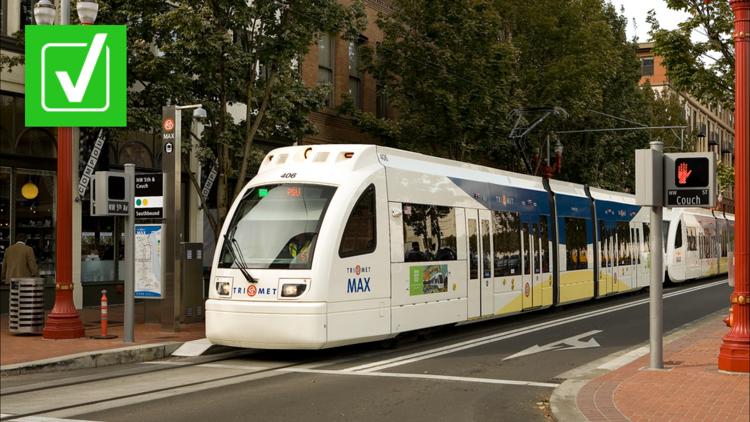PORTLAND, Ore. — Portland is going to be hit with a major heat wave this weekend and into early next week, with temperatures expected to get into the triple digits from Friday through Tuesday, with a forecasted peak high of 104 degrees on Sunday and Monday.
Past summer weather has prompted TriMet to warn riders to prepare for delays because MAX and WES trains will need to slow down if temperatures rise above a certain point. But the cutoff was previously often described as 90 or 95 degrees, and Portland has already seen a few 90-degree days this summer without any heat-related train delays. So is it still a problem?
THE QUESTION
Do heat waves or high temperatures cause TriMet MAX delays?
THE SOURCES
THE ANSWER
Yes, heat waves can cause MAX delays because trains have to slow down. TriMet has upgraded the system in recent years to maintain full speed at higher temperatures, but there's still an upper limit.
WHAT WE FOUND
A TriMet news release for the upcoming heat wave lays out a simple set of rules: At any temperature below 100 degrees, all trains run normally. At 100 degrees or higher, all MAX trains will be limited to a top speed of 35 miles per hour, and all WES trains will be limited to 40 miles per hour.
At 105 degrees, the WES trains stop running. If temperatures get that high, TriMet may adjust or suspend service on MAX trains, but that decision is made based on conditions throughout the system and out of consideration for the safety of riders and employees.
Temperatures will definitely cross the 100-degree mark this weekend, but as of Friday, the forecast doesn't call for the Portland area to hit 105 degrees, though it will come close on Sunday and Monday with a forecast of 104 degrees. So, while train slowdowns are likely, it remains to be seen whether a total pause will be necessary.
The rules used to be a little more complicated, with lower temperature thresholds for heat-related delays. A 2015 TriMet blog post warned that MAX trains in high speed areas would need to start slowing down by 10 mph at just 90 degrees, and WES trains would be limited to 30 mph starting at 95 degrees.
So, what changed?
TriMet's post this week explains how the agency has upgraded the system over the past few years in response to rising summer temperatures. MAX trains are powered by overhead wires, which have to be kept taut so the train's pantograph arm can maintain steady contact. But the wires are made of copper, which expands when heated and can cause sagging.
The wires are equipped with counterweights on the poles to maintain tension; as temperatures rise and the wires stretch out, the counterweights sink and pull the excess slack down, keeping the wires taut. But once the counterweights sink all the way to the ground, any additional stretching will cause the lines to sag between poles, forcing trains to slow down for safety. If the sagging gets too bad, they have to stop entirely.
The cutoff to start slowing down used to be 90 degrees, but TriMet explained that it's been replacing the counterweights with more compact versions, allowing them to drop a little lower and pick up a little more slack than they previously could — enough to bump the cutoff up from 90 degrees to 100 degrees.
The upgrades started on the Red and Blue lines in 2018 but took a few years to be implemented systemwide, according to TriMet; this year is the first summer where the entire system can keep running at full speed when temperatures are in the 90s.
TriMet's WES trains are diesel-powered and run on Portland & Western freight rail tracks with no overhead wires, but they can still get tripped up by heat waves because the high temperatures can also cause the steel rails to expand and temporarily deform — a phenomenon called "sun kinks" — making it unsafe to drive trains over them at full speed.
The problem isn't unique to the WES; freight trains and Amtrak Cascades trains also have to slow down in high heat, and experts worry that rising global temperatures will contribute to an increase in train derailments caused by sun kinks.
But track upgrades can help a little bit, and TriMet said it's been working with Portland & Western in recent years to make improvements that also allow the WES to run faster in high heat, at least up to a point.



